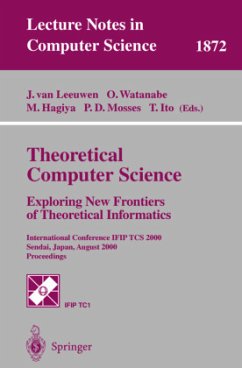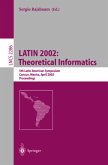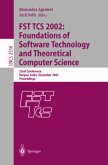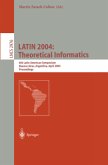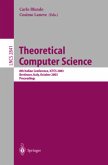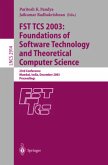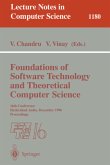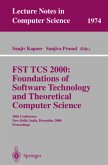Jan van Leeuwen / Osamu Watanabe / Masami Hagiya / Peter D. Mosses / Takayasu Ito (eds.)International Conference IFIP TCS 2000 Sendai, Japan, August 17-19, 2000 Proceedings
Theoretical Computer Science: Exploring New Frontiers of Theoretical Informatics
International Conference IFIP TCS 2000 Sendai, Japan, August 17-19, 2000 Proceedings
Herausgegeben:Leeuwen, Jan van; Watanabe, Osamu; Hagiya, Masami; Mosses, Peter D.; Ito, Takayasu
Jan van Leeuwen / Osamu Watanabe / Masami Hagiya / Peter D. Mosses / Takayasu Ito (eds.)International Conference IFIP TCS 2000 Sendai, Japan, August 17-19, 2000 Proceedings
Theoretical Computer Science: Exploring New Frontiers of Theoretical Informatics
International Conference IFIP TCS 2000 Sendai, Japan, August 17-19, 2000 Proceedings
Herausgegeben:Leeuwen, Jan van; Watanabe, Osamu; Hagiya, Masami; Mosses, Peter D.; Ito, Takayasu
- Broschiertes Buch
- Merkliste
- Auf die Merkliste
- Bewerten Bewerten
- Teilen
- Produkt teilen
- Produkterinnerung
- Produkterinnerung
In 1996 the International Federation for Information Processing (IFIP) establ- hed its rst Technical Committee on foundations of computer science, TC1. The aim of IFIP TC1 is to support the development of theoretical computer science as a fundamental science and to promote the exploration of fundamental c- cepts, models, theories, and formal systems in order to understand laws, limits, and possibilities of information processing. This volume constitutes the proceedings of the rst IFIP International C- ference on Theoretical Computer Science (IFIP TCS 2000) { Exploring New Frontiers of…mehr
Andere Kunden interessierten sich auch für
![LATIN 2002: Theoretical Informatics LATIN 2002: Theoretical Informatics]() Sergio Rajsbaum (ed.)LATIN 2002: Theoretical Informatics77,99 €
Sergio Rajsbaum (ed.)LATIN 2002: Theoretical Informatics77,99 €![FST TCS 2002: Foundations of Software Technology and Theoretical Computer Science FST TCS 2002: Foundations of Software Technology and Theoretical Computer Science]() Manindra Agrawal / Anil Seth (eds.)FST TCS 2002: Foundations of Software Technology and Theoretical Computer Science39,99 €
Manindra Agrawal / Anil Seth (eds.)FST TCS 2002: Foundations of Software Technology and Theoretical Computer Science39,99 €![LATIN 2004: Theoretical Informatics LATIN 2004: Theoretical Informatics]() Martin Farach-Colton ( Ed. )LATIN 2004: Theoretical Informatics77,99 €
Martin Farach-Colton ( Ed. )LATIN 2004: Theoretical Informatics77,99 €![Theoretical Computer Science Theoretical Computer Science]() Carlo Blundo / Cosimo Laneve (eds.)Theoretical Computer Science39,99 €
Carlo Blundo / Cosimo Laneve (eds.)Theoretical Computer Science39,99 €![FST TCS 2003: Foundations of Software Technology and Theoretical Computer Science FST TCS 2003: Foundations of Software Technology and Theoretical Computer Science]() Paritosh K Pandya / Jaikumar Radhakrishnan (Bearb.)FST TCS 2003: Foundations of Software Technology and Theoretical Computer Science39,99 €
Paritosh K Pandya / Jaikumar Radhakrishnan (Bearb.)FST TCS 2003: Foundations of Software Technology and Theoretical Computer Science39,99 €![Foundations of Software Technology and Theoretical Computer Science Foundations of Software Technology and Theoretical Computer Science]() ChandruFoundations of Software Technology and Theoretical Computer Science39,99 €
ChandruFoundations of Software Technology and Theoretical Computer Science39,99 €![FST TCS 2000: Foundations of Software Technology and Theoretical Science FST TCS 2000: Foundations of Software Technology and Theoretical Science]() Sanjiv Kapoor / Sanjiva Prasad (eds.)FST TCS 2000: Foundations of Software Technology and Theoretical Science39,99 €
Sanjiv Kapoor / Sanjiva Prasad (eds.)FST TCS 2000: Foundations of Software Technology and Theoretical Science39,99 €-
-
-
In 1996 the International Federation for Information Processing (IFIP) establ- hed its rst Technical Committee on foundations of computer science, TC1. The aim of IFIP TC1 is to support the development of theoretical computer science as a fundamental science and to promote the exploration of fundamental c- cepts, models, theories, and formal systems in order to understand laws, limits, and possibilities of information processing. This volume constitutes the proceedings of the rst IFIP International C- ference on Theoretical Computer Science (IFIP TCS 2000) { Exploring New Frontiers of Theoretical Informatics { organized by IFIP TC1, held at Tohoku University, Sendai, Japan in August 2000. The IFIP TCS 2000 technical program consists of invited talks, contributed talks, and a panel discussion. In conjunction with this program there are two special open lectures by Professors Jan van Leeuwen and Peter D. Mosses. The decision to hold this conference was made by IFIP TC1 in August 1998, and since then IFIP TCS 2000 has bene ted from the e orts of many people; in particular, the TC1 members and the members of the Steering Committee, the Program Committee, and the Organizing Committee of the conference. Our special thanks go to the Program Committee Co-chairs: Track (1): Jan van Leeuwen (U. Utrecht), Osamu Watanabe (Tokyo Inst. Tech.) Track (2): Masami Hagiya (U. Tokyo), Peter D. Mosses (U. Aarhus).
Produktdetails
- Produktdetails
- Lecture Notes in Computer Science 1872
- Verlag: Springer / Springer Berlin Heidelberg / Springer, Berlin
- Artikelnr. des Verlages: 978-3-540-67823-6
- 2000.
- Seitenzahl: 652
- Erscheinungstermin: 26. Juli 2000
- Englisch
- Abmessung: 235mm x 155mm x 35mm
- Gewicht: 903g
- ISBN-13: 9783540678236
- ISBN-10: 3540678239
- Artikelnr.: 23379635
- Herstellerkennzeichnung
- Springer-Verlag GmbH
- Tiergartenstr. 17
- 69121 Heidelberg
- ProductSafety@springernature.com
- Lecture Notes in Computer Science 1872
- Verlag: Springer / Springer Berlin Heidelberg / Springer, Berlin
- Artikelnr. des Verlages: 978-3-540-67823-6
- 2000.
- Seitenzahl: 652
- Erscheinungstermin: 26. Juli 2000
- Englisch
- Abmessung: 235mm x 155mm x 35mm
- Gewicht: 903g
- ISBN-13: 9783540678236
- ISBN-10: 3540678239
- Artikelnr.: 23379635
- Herstellerkennzeichnung
- Springer-Verlag GmbH
- Tiergartenstr. 17
- 69121 Heidelberg
- ProductSafety@springernature.com
Breaking and fixing the Needham-Schroeder public-key protocol using FDR.- Reconciling Two Views of Cryptography.- Theory and Construction of Molecular Computers.- Theory and Construction of Molecular Computers.- On the hardness of the permanent.- List Decoding: Algorithms and Applications.- Approximation Algorithms for String Folding Problems.- Approximation Algorithms for String Folding Problems.- Fast multi-dimensional approximate string matching.- An Index for Two Dimensional String Matching Allowing Rotations.- Parallel Edge Coloring of a Tree on a Mesh Connected Computer.- Parallel Edge Coloring of a Tree on a Mesh Connected Computer.- Linear Time 1/2-Approximation Algorithm for Maximum Weighted Matching in General Graphs.- Parallel Approximation Algorithms for Maximum Weighted Matching in General Graphs.- It Is on the Boundary: Complexity Considerations for Polynomial Ideals.- It Is on the Boundary: Complexity Considerations for Polynomial Ideals.- An Efficient Parallel Algorithm for Scheduling Interval Ordered Tasks.- An Efficient Parallel Algorithm for Scheduling Interval Ordered Tasks.- Reducibility among combinatorial problems.- Task Distributions on Multiprocessor Systems.- Fast Interpolation Using Kohonen Self-Organizing Neural Networks.- Fast Interpolation Using Kohonen Self-Organizing Neural Networks.- Steganography Using Modern Arts.- Steganography Using Modern Arts.- Gossiping in Vertex-Disjoint Paths Mode in d-dimensional Grids and Planar Graphs.- Trade-Offs between Density and Robustness in Random Interconnection Graphs.- An effcient way for edge-connectivity augmentation.- The (? + 1)-Edge-Connectivity Augmentation Problem without Creating Multiple Edges of a Graph.- On the Approximability of NP-complete Optimization Problems.- On the Hardness ofApproximating Some NP-Optimization Problems Related to Minimum Linear Ordering Problem.- How Many People Can Hide in a Terrain ?.- Maximum Clique and Minimum Clique Partition in Visibility Graphs.- Language recognition and the synchronization of cellular automata.- Real-Time Language Recognition by Alternating Cellular Automata.- Inducing an order on cellular automata by a grouping operation.- Damage Spreading and ?-Sensitivity on Cellular Automata.- Financial Applications of Monte Carlo and Quasi-Monte Carlo Methods.- Discrepancy Theory and Its Application to Finance.- Fully consistent extensions of partially defined Boolean functions with missing bits.- Fully Consistent Extensions of Partially Defined Boolean Functions with Missing Bitsv.- Dealing necessary and sufficient numbers of cards for sharing a one-bit secret key.- Characterization of Optimal Key Set Protocols.- Algebraic Complexity Theory.- On the Complexity of Integer Programming in the Blum-Shub-Smale Computational Model.- On Logarithmic Simulated Annealing.- On Logarithmic Simulated Annealing.- Specification and verification of concurrent programs in CESAR.- Hierarchical State Machines.- Validating firewalls in mobile ambients.- Ambient Groups and Mobility Types.- Multiway synchronization verified with coupled simulation.- An Asynchronous, Distributed Implementation of Mobile Ambients.- Graph types for monadic mobile processes.- Type Systems for Concurrent Processes: From Deadlock-Freedom to Livelock-Freedom, Time-Boundedness.- Aliasing Models for Mobile Objects.- Local ?-Calculus at Work: Mobile Objects as Mobile Processes.- Typed concurrent objects.- An Interpretation of Typed Concurrent Objects in the Blue Calculus.- Inductive definitions in the system coq. rules and properties.- A Higher-OrderSpecification of the ?-Calculus.- Compositionality through an operational semantics of contexts.- Open Ended Systems, Dynamic Bisimulation and Tile Logic.- Observe behaviour categorically.- Fibred Models of Processes: Discrete, Continuous, and Hybrid Systems.- The Equivalence Problem for Deterministic Pushdown Automata is Decidable.- On the Complexity of Bisimulation Problems for Pushdown Automata.- Session 2.4.- A Type-Theoretic Study on Partial Continuations.- Partially Typed Terms between Church-Style and Curry-Style.- Alternating Automata and Logics over Infinite Words.- Hypothesis Support for Information Integration in Four-Valued Logics.- Invited Talk 2.2.- Masaccio: A Formal Model for Embedded Components.- Session 2.5.- A Single Complete Refinement Rule for Demonic Specifications.- Reasoning about Composition Using Property Transformers and Their Conjugates.- Invited Talk 2.3.- Some New Directions in the Syntax and Semantics of Formal Languages.- Panel Discussion on New Challanges for TCS.- New Challenges for Theoretical Computer Science.- Algorithm Design Challenges.- Quantumization of Theoretical Informatics.- Two Problems in Wide Area Network Programming.- New Challenges for Computational Models.- Towards a Computational Theory of Everything.- Open Lectures.- On the Power of Interactive Computing.- The Varieties of Programming Language Semantics.
Breaking and fixing the Needham-Schroeder public-key protocol using FDR.- Reconciling Two Views of Cryptography.- Theory and Construction of Molecular Computers.- Theory and Construction of Molecular Computers.- On the hardness of the permanent.- List Decoding: Algorithms and Applications.- Approximation Algorithms for String Folding Problems.- Approximation Algorithms for String Folding Problems.- Fast multi-dimensional approximate string matching.- An Index for Two Dimensional String Matching Allowing Rotations.- Parallel Edge Coloring of a Tree on a Mesh Connected Computer.- Parallel Edge Coloring of a Tree on a Mesh Connected Computer.- Linear Time 1/2-Approximation Algorithm for Maximum Weighted Matching in General Graphs.- Parallel Approximation Algorithms for Maximum Weighted Matching in General Graphs.- It Is on the Boundary: Complexity Considerations for Polynomial Ideals.- It Is on the Boundary: Complexity Considerations for Polynomial Ideals.- An Efficient Parallel Algorithm for Scheduling Interval Ordered Tasks.- An Efficient Parallel Algorithm for Scheduling Interval Ordered Tasks.- Reducibility among combinatorial problems.- Task Distributions on Multiprocessor Systems.- Fast Interpolation Using Kohonen Self-Organizing Neural Networks.- Fast Interpolation Using Kohonen Self-Organizing Neural Networks.- Steganography Using Modern Arts.- Steganography Using Modern Arts.- Gossiping in Vertex-Disjoint Paths Mode in d-dimensional Grids and Planar Graphs.- Trade-Offs between Density and Robustness in Random Interconnection Graphs.- An effcient way for edge-connectivity augmentation.- The (? + 1)-Edge-Connectivity Augmentation Problem without Creating Multiple Edges of a Graph.- On the Approximability of NP-complete Optimization Problems.- On the Hardness ofApproximating Some NP-Optimization Problems Related to Minimum Linear Ordering Problem.- How Many People Can Hide in a Terrain ?.- Maximum Clique and Minimum Clique Partition in Visibility Graphs.- Language recognition and the synchronization of cellular automata.- Real-Time Language Recognition by Alternating Cellular Automata.- Inducing an order on cellular automata by a grouping operation.- Damage Spreading and ?-Sensitivity on Cellular Automata.- Financial Applications of Monte Carlo and Quasi-Monte Carlo Methods.- Discrepancy Theory and Its Application to Finance.- Fully consistent extensions of partially defined Boolean functions with missing bits.- Fully Consistent Extensions of Partially Defined Boolean Functions with Missing Bitsv.- Dealing necessary and sufficient numbers of cards for sharing a one-bit secret key.- Characterization of Optimal Key Set Protocols.- Algebraic Complexity Theory.- On the Complexity of Integer Programming in the Blum-Shub-Smale Computational Model.- On Logarithmic Simulated Annealing.- On Logarithmic Simulated Annealing.- Specification and verification of concurrent programs in CESAR.- Hierarchical State Machines.- Validating firewalls in mobile ambients.- Ambient Groups and Mobility Types.- Multiway synchronization verified with coupled simulation.- An Asynchronous, Distributed Implementation of Mobile Ambients.- Graph types for monadic mobile processes.- Type Systems for Concurrent Processes: From Deadlock-Freedom to Livelock-Freedom, Time-Boundedness.- Aliasing Models for Mobile Objects.- Local ?-Calculus at Work: Mobile Objects as Mobile Processes.- Typed concurrent objects.- An Interpretation of Typed Concurrent Objects in the Blue Calculus.- Inductive definitions in the system coq. rules and properties.- A Higher-OrderSpecification of the ?-Calculus.- Compositionality through an operational semantics of contexts.- Open Ended Systems, Dynamic Bisimulation and Tile Logic.- Observe behaviour categorically.- Fibred Models of Processes: Discrete, Continuous, and Hybrid Systems.- The Equivalence Problem for Deterministic Pushdown Automata is Decidable.- On the Complexity of Bisimulation Problems for Pushdown Automata.- Session 2.4.- A Type-Theoretic Study on Partial Continuations.- Partially Typed Terms between Church-Style and Curry-Style.- Alternating Automata and Logics over Infinite Words.- Hypothesis Support for Information Integration in Four-Valued Logics.- Invited Talk 2.2.- Masaccio: A Formal Model for Embedded Components.- Session 2.5.- A Single Complete Refinement Rule for Demonic Specifications.- Reasoning about Composition Using Property Transformers and Their Conjugates.- Invited Talk 2.3.- Some New Directions in the Syntax and Semantics of Formal Languages.- Panel Discussion on New Challanges for TCS.- New Challenges for Theoretical Computer Science.- Algorithm Design Challenges.- Quantumization of Theoretical Informatics.- Two Problems in Wide Area Network Programming.- New Challenges for Computational Models.- Towards a Computational Theory of Everything.- Open Lectures.- On the Power of Interactive Computing.- The Varieties of Programming Language Semantics.

